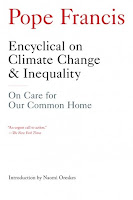We were not meant to be inundated by cement, asphalt, glass and metal, and deprived of physical contact with nature.
The human environment and the natural environment deteriorate together; we cannot adequately combat environmental degradation unless we attend to causes related to human and social degradation. (Location 564)
“Both everyday experience and scientific research show that the gravest effects of all attacks on the environment are suffered by the poorest.”
Today, however, we have to realize that a true ecological approach always becomes a social approach; it must integrate questions of justice in debates on the environment, so as to hear both the cry of the earth and the cry of the poor. (Loc. 580)
And now for some other voices:
What happened in the first years of the seventeenth century was no gradual development, no addition to what had gone before, but a complete break with the past and a radical new beginning.
This modern belief in reason, with science as its handmaiden, was inherently optimistic; it confidently adhered to the notion of progress. As humankind’s understanding of the universe and its mechanisms increased, so too did its ability to gain control over nature and improve the conditions of human life.
The paradox is now fully established that the utmost abstractions are the true weapons with which to control our thought of concrete fact.
The problem of the thing in itself is one of the most puzzling problems in Kant’s philosophy. What makes it so puzzling is the fact that it seems impossible to state the problem without flatly contradicting yourself. The problem is stated in some such way as this: Whatever we know, we know at once intuitively and discursively, that is, by the combined use of our senses and understanding. The only genuine intuition is sensuous intuition, and the only valid use of the understanding is to think about things which we sensuously perceive. The only knowledge, therefore, is an intelligent or thoughtful perception.
“The point, therefore, is not that ‘complexity’ is a problem entirely unique to our age. It is rather (1) that ‘complexity’ has now become a crucial and perhaps even unavoidable consideration in many of our most pressing questions about the world and (2) that to deal with ‘complexity’ seriously seems to present some extraordinary difficulties for our understanding” (Langdon Winner, “Complexity and the Limits of Human Understanding,” in Organized Social Complexity: Challenge to Politics and Policy, ed. Todd La Porte [Princeton: Princeton University Press, 1975].
The appeal of demagogues lies in their ability to take a generalized discontent, the mood of drift, resentment, disillusionment and economic shakiness, and transform it into a plan for doing something. They make inaction seem morally degrading. And many young men and women become eager to transform their powerlessness into an irrepressible rage to hurt or destroy.
Burke’s horrified reaction to the killing of the French king and queen helps point us toward another, far fiercer right-wing critique of liberalism. That assault finds in liberalism a fatal overreliance on reason. It shares Burke’s sense of the chaos that could follow from the belief that society should be remade all at once on the basis of a big idea, with tradition and custom annihilated.









No comments:
Post a Comment